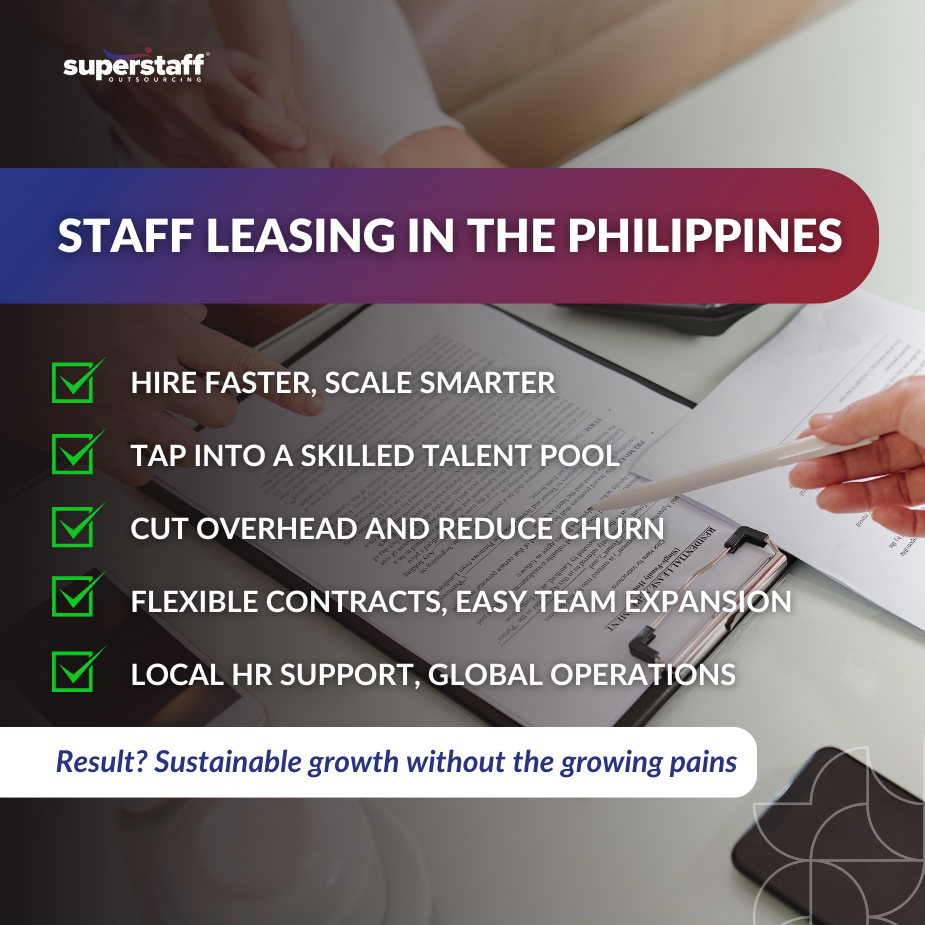
Building a strong team doesn’t always require hiring full-time employees on-site. For many companies, staff leasing in the Philippines has become a practical solution to scale without increasing costs or losing control of operations. With a large talent pool, strong English fluency, and a long history of outsourcing, the Philippines offers real advantages for businesses looking to grow steadily.
This approach works especially well for companies in the U.S., Canada, and Europe that want to expand their workforce without going through the process of direct hiring. Staff leasing provides flexibility, efficiency, and access to skilled professionals—all managed through a trusted third-party provider.
Let’s explore how staff leasing in the Philippines supports long-term growth while helping businesses stay lean and focused.

Understanding Staff Leasing in the Philippines
Staff leasing allows companies to manage daily tasks while the provider handles employment logistics. Here’s how the model works and why it’s a smart move for scaling businesses.
1. The Basics of Staff Leasing
Staff leasing in the Philippines involves working with a provider that recruits, hires, and manages employees on your behalf. The provider takes care of HR, payroll, taxes, and compliance. Your business, however, directs the day-to-day work.
2. Control Without the Overhead
You maintain control over how work is done while avoiding the overhead of hiring and managing employees directly. It’s a good fit for businesses that need to grow teams quickly without investing in local infrastructure.
3. No Need for a Local Entity
Businesses can lease staff without setting up a physical office or legal entity in the Philippines. The provider handles all the employment requirements, so you can operate smoothly across borders.
4. Works for Any Business Size
Startups, SMEs, and large enterprises all benefit from this model. Whether you need one team member or a full department, staff leasing in the Philippines offers scalable options.
5. Industry-Agnostic Model
This model is used in many sectors, including healthcare, finance, e-commerce, logistics, tech support, and back-office operations.
Why the Philippines Is a Preferred Location
The country has long been known for its outsourcing expertise. But when it comes to staff leasing, the Philippines offers unique advantages that make it one of the best global staffing hubs.
1. Skilled and Educated Workforce
The Philippines produces thousands of college graduates yearly, many with experience in customer service, finance, IT, and healthcare. They are ready to contribute to global teams.
2. English Fluency and Western Alignment
Clear communication is essential. Staff leasing in the Philippines ensures smooth interaction thanks to the country’s strong English proficiency and familiarity with Western work culture.
3. Cost Savings
Wages and operational expenses are significantly lower compared to Western markets. Companies save on salaries, benefits, and office costs while still maintaining quality.
4. Strong BPO Infrastructure
The country has a well-established outsourcing ecosystem. From internet connectivity to labor laws, everything is built to support international clients.
5. Government Support
The Philippine government provides support and incentives to the BPO sector. This makes it easier and more secure for foreign companies to outsource to the Philippines.
Key Advantages of the Staff Leasing Model
Using a flexible staffing model allows businesses to grow at their own pace while managing risks. Here’s how it supports efficiency and sustainability.
1. Lower Administrative Burden
The provider manages HR, legal compliance, payroll, and benefits. This gives companies more time to focus on their core functions.
2. Faster Hiring Process
Providers often have talent pipelines in place. This means your team can be assembled faster compared to traditional recruitment methods.
3. Better Cost Control
Budgets are easier to manage with fixed monthly rates. No surprise expenses or added administrative costs.
4. Focused Expertise
You can lease staff who already have experience in your industry. This reduces training time and improves quality from the start.
5. Flexible Team Structures
You can choose between part-time, full-time, or project-based staff depending on your needs. This kind of flexible staffing model is ideal for companies facing seasonal spikes or rapid growth.
Industries That Benefit Most From Staff Leasing
Staff leasing in the Philippines is not limited to one type of business. A wide range of industries use this model to build remote teams and reduce hiring friction.
1. E-Commerce and Retail
Customer service, inventory support, and order processing are common roles handled through staff leasing.
2. Healthcare Support
Companies in the healthcare sector lease remote medical assistants, billing specialists, and claims processors.
3. Logistics and Transportation
Staff leasing helps manage shipping coordination, customer communication, and carrier support.
4. Financial Services
Accounting, bookkeeping, and compliance support roles are often leased by firms looking to reduce costs without losing control.
5. Tech and SaaS
Help desk support, product onboarding, and QA testing can all be handled by offshore teams managed through a trusted partner.
How Staff Leasing in the Philippines Helps Businesses Scale
This model isn’t just about saving money; it’s also a growth strategy. It gives businesses the tools and workforce needed to expand into new markets.
1. Scalable Operations
Easily increase or reduce team size based on current demand. No long-term commitments required.
2. Access to Specialized Talent
The Philippines has professionals with skills in a wide range of industries. You get the right people for the right tasks.
3. Reliable Staffing for Global Coverage
Operate across different time zones with teams that can provide round-the-clock support if needed.
4. Improved Business Focus
Instead of spending time on HR or admin, leadership can focus on building products, winning clients, and driving strategy.
5. Faster Market Entry
Staff leasing in the Philippines allows you to launch new services or enter new regions faster by having a ready-to-work team.
Choosing the Right Leasing Partner
The success of your leased team depends on your provider. Make sure you evaluate them carefully before making a decision.
1. Experience and Track Record
Look for a partner with proven experience in staff leasing, especially in your industry.
2. Recruitment and Onboarding Process
Ask how they recruit and train staff. A strong process ensures high-quality hires.
3. Communication and Reporting
Regular updates, KPI tracking, and performance reports are essential for managing your remote team.
4. Security and Compliance
Ensure the provider has data protection measures and follows employment laws both locally and internationally.
5. Customization Options
The best partners will offer flexible models that match your exact business needs.
Build Smarter Teams With Staff Leasing Solutions
Staff leasing in the Philippines offers a smart and efficient way to grow your workforce without increasing your fixed costs. With access to trained professionals, a flexible staffing model, and the support of a reliable partner, you can expand your operations and stay competitive in any market.
SuperStaff helps global companies scale by offering tailored staff leasing solutions built for long-term growth. Whether you’re building a new team or expanding existing operations, SuperStaff can connect you with skilled professionals who are ready to support your goals.
Outsource to the Philippines through a team that understands your needs and can deliver results.
Contact SuperStaff today to learn how staff leasing in the Philippines helps businesses scale with flexibility, speed, and confidence.






